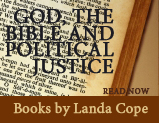Gud, Bibelen og politiske Justice: Kapittel 10
Del 2: Moses og den normative Law
Kapittel 10
Cities of Refuge and Due Process
God understands that the “red thread of violence” which began in Genesis four will continue in the promise land with His chosen people. Dette, Selvfølgelig, does not surprise Moses who has already murdered an Egyptian guard and fled the consequences for 40 år. There is no “idealism” in God’s thinking. He knows the heart of man and all that we are capable of and moves on with His plan for redemption. He goes to great pains, men, til limit the damage of sin along the way. And so, after distributing the tribal lands, God sets aside land and cities in each of the tribal territories for the priesthood as cities of refuge.
Measures must be in place in any just society to mitigate the damages of violence. These measures are to protect the community from the violent individual but also are to protect the individual from violent communities.
Is it possible that one of the ways we can measure how discipled a nation’s judicial system is, is by whether due process is more or less accessible and efficient? Without a working system for due process no nation can be just. The effectiveness of that system then becomes a way to evaluate the level of justice development and what needs to be changed to create a more just society.
Cities of Refuge: Protection
The prescriptive law makes the need to provide protection and judicial process for violent crime the second priority. Interesting that the emphasis is on protecting the accused in these passages. Med andre ord, in this historic context, the greater danger seems to have been mob and community violence.
The assumption of these laws is that people will be killed, accidently or intentionally, and inflamed family and friends will seek revenge. Derfor, there will need to be “a place” where the accused can be protected until due process has run its course. These cities were to be strategically placed throughout the country and roads built so they were accessible. They were to be cities administrated by the Levitical priesthood and so; in essence, den Priests would administrate sanctuary and protection until trial. As the population of the territories increased the Law made provision for adding more cities of refuge, making sure the system served the needs of the population.
Key Passages: Femte Mosebok 4:41-43, 19:1-13, Tall 35
Due Process
What constitutes due process from one culture to another can be vastly different. Igjen, if we are going to build God’s understanding of justice into our societies, we must deal with the meaning of our terms. Does God have a definition of due process? Does He give us a set of values we can use to evaluate and apply today? He does! As God began to reveal in Genesis in the first trials of Adam and Cain, the Biblical system of due process includes beskyttelse, evidence, motive, finding, judicial limits, sentence and appeal.
Femte Mosebok 25: 1 When people have a dispute, they are to take it to court og the judges will decide the case, frikjenne den uskyldige og fordømte den skyldige. 2 If the guilty person deserves to be beaten, the judge shall make them lie down and have them flogged in his presence with the number of lashes the crime deserves, 3 but the judge must not impose more than forty lashes. If the guilty party is flogged more than that, your fellow Israelite will be degraded in your eyes.
The Trial
A trial was mandated by the Law with judicial representative for every group of ten people. There was no excuse for taking justice into your own hands. God models the elements of a trial for us as we discussed in chapter two. Disrespect for judicial authority was held on par with that of priestly and parental authority. The rejection of any one of the three was considered a crime punishable by death, as we will see in the next chapter.
This sounds unbelievable harsh at face value. But when put in the context of what God gives us it is clear God is speaking about something far direr than a mere attitude issue. He is talking about restraint of actions that lead to violence and the loss of human life. He is warning us that, human beings, with no respect of at least some authority greater than themselves will become a destructive force threatening the value of all life. We may not be able to require them to “believe” in something but society must make them “obey” something or self-destruct taking the community with them. God’s earthly line of defense against mass destruction is civil law and judicial process. This is less about the rebellious teenager and more about the sociopath.
The Evidence and Witnesses
A second emphasis for due process is evidence and the evidence required in the Law are witnesses, at least two or three witness in a criminal trial.
One witness was not enough to convict of any crime.
Femte Mosebok 19:15 One witness is not enough to convict anyone accused of any crime or offense they may have committed. A matter must be established by the testimony of two eller tre witnesses.
Tall 35: 30 “‘Anyone who kills a person is to be put to death as a murderer only on the testimony of witnesses. Men no one is to be put to death on the testimony of only one witness.
The rules of evidence build on the five Biblical presuppositions. If there is no reality of the material world there is no truth or evidence. If our words cannot be measured against the reality of that material world there is no truth, witness or testimony. If there is no truth to our actions there is no guilt or innocence. They are ludicrous illusions at best. And if our words mean nothing, there is no justice, no promise, no contract, no commitment, no love and no hope.
Our reality and significance as human beings is established through our words. And so when it comes to evidence it is testimony that is emphasized. In this way God makes not only the accused responsible for their actions, but the community responsible for their own safety. The police and the courts can do very little if no one in the community will speak up. But in contrast, if there is a culture of truth and transparency then due process becomes much easier. At a local level, someone almost always knows what happened. A community that will pay the price of openness will be safer than a community where no one will speak up.
Femte Mosebok 19:16 drives home the essentialness of a trustworthy community in dealing with “malicious and false testimony.” The instructions here are that if it is proved that a witness has lied and conspired with the objective of false conviction then the courts must convict that witness of perjury and pronounce the same sentence and consequences that they sought for the innocent party. Gud er holding the community responsible for its own protection.
Key Passages: Femte Mosebok 5:20, 17:5-7, 19:15-21 Ex 23:1-2, Tall 35:30
The Motive
Accidents will happen and people will die. Death is an unavoidable reality in a fallen world. Within these passages God notes the difference between intentional and unintentional killing.
Was the incident a crime or a tragic accident? I Numbers 35:16-21 you can almost hear the ancient voices saying “but what if they killed him with an ax, a stone, a piece of wood? What if they shoved them, threw something, hit them with their fist? They are trying to figure out what constitutes “intentional” by the “instrument” used in the killing. Today we could add our own list. What if they hit them with a car, gave them Aids, fake pharmaceuticals? Can malice include indifference to life? By the time we get through the Law it is understood that “what they killed them with” is not the question of importance. Why they killed them and the intent to kill define motive.
Tall 35:16 “‘If anyone strikes someone a fatal blow with an iron object, that person is a murderer; the murderer is to be put to death. 17 Or if anyone is holding a stone and strikes someone a fatal blow with it, that person is a murderer; the murderer is to be put to death. 18 Or if anyone is holding a wooden object and strikes someone a fatal blow with it, that person is a murderer; the murderer is to be put to death. 19 The avenger of blood shall put the murderer to death; when the avenger comes upon the murderer, the avenger shall put the murderer to death. 20 If anyone with malice aforethought shoves another or throws something at them intentionally so that they die 21 or if out of enmity one person hits another with their fist so that the other dies, that person is to be put to death; that person is a murderer. The avenger of blood shall put the murderer to death when they meet.
Both passages in Deuteronomy and Numbers start with the distinction between intentional og unintentional. Intentional is measured by “malice” or intent to do harm and “aforethought” or intent determined before the action and the outcome understood. The example used in Deuteronomy 19 is of two workmen in the forest cutting wood when the axe head accidentally flies off killing one. This constitutes “without malice or aforethought.” Meaning, there was “no intent” eller “prior knowledge” of consequences in the accused. The assumption being if they had known, they would have stopped and fixed the axe head. And so if you have had an accident with your car under the influence of alcohol you may have “no malice” but you may have “aforethought” in that you knew your drunk driving caused danger to yourself and others. Men, if while you were under the influence or not, you planned to run over an enemy and do him bodily harm, then you have malice og aforethought. This constitutes mord, a capitol or “grave” offense.
Our court systems must be able to determine when death was unnecessary and prosecute those who intentionally speed up the demise of another human being.
The Appeal
We saw the first appeal process in Genesis four when Cain asks God for protection of his life in exile. This process is built into the institution of governance in Deuteronomy one when Moses establishes judicial representatives over 10, 50, 100 og 1,000 and then instructs in verse 17 that any case too difficult for these judges can be brought to the Executive leader. He instructs that a case that cannot be resolved even in the Executive must then be presented to the High Priest for finding.
The appeal process emphasizes two things. Første, the importance of closure in issues of justice. Without closure, or a finding, the unresolved issue will continue to fester in the community creating an environment for violence. A final judgment does not assure perfect justice. But it does pronounce closure to the case and the exhortation in Deuteronomy 17:11-12 to “Act according to the law they teach you and the decisions they give you” is a mandate to accept these findings and move on. Selvfølgelig, the more corrupt the system, the harder this is.
The second thing the appeals process emphasizes is the importance of checks and balances in the judicial system. It is more difficult to corrupt six levels of appeals than to corrupt one judge.
Key Passages: Femte Mosebok 1:15-18, 17:8-13,
Judicial Limits and Checks and Balances
God’s design for due process assures that a system of checks and balances are in place. The national government creates the system, designates the locations and builds the infrastructure. The priesthood provides refuge and sanctuary until trial and the local courts have jurisdiction over the case unless there is an appeal.
This tension of authorities provides a better possibility of justice. One judge is more easily corrupted than three and three institutions are harder to corrupt than one. Two or three witnesses are harder to corrupt than one. Derfor, i en fallen verden, the more tension we have in due process the safer our society is from corruption. Corruption will always be with us but it cannot dominate the system with a strong balance of powers in place. Some feel this is the most important and completely unique contribution of the Law of Moses to judicial thought.
The objective of eliminating corruption all together from our societies is like saying “we will get rid of sin.” We will not accomplish this. God Himself makes that clear. We are trying to limit the damage and be a testimony to what perfect justice could look like and will look like when the King returns. We are working for the best judicial system possible.
Judicial Limits
As with all other authorities God places limits on the sentences applied by the Judiciary. Three values are to guide their decisions.
Sentences must not degrade the value of the convicted’s life. Femte Mosebok 21:22-23 Examples include leaving the body of an executed criminal hanging out all night. They are to be taken down and buried with respect. The life of the convicted has value as well. A second example has to do with the sentence is whipping. The court may not exceed 40 lashes, which was the acceptable limit. More than that degraded the convicted in the eyes of the public. Femte Mosebok 25:1-2
No ransom may be offered for the life of a convicted murderer.
Tall 35: 31 “‘Do not accept a ransom for the life of a murderer, who deserves to die. They are to be put to death. The value here is the right of the community to be protected from those who have shown wonton disregard for human life.
The consequences of the crime may not exceed the consequences of the crime itself. The eye for an eye passages reinforce the innate equality of all human beings. No one’s eye is worth two of another’s eye. No life is worth many others. We must see these limits in the light of the day. Remember in Genesis four Lamech boasts he will kill a man for slapping him and 77 people for taking a single life. Nowhere in the known world at the time of Moses was the judiciary so limited in the amount of punishment they could meet out (meet out? Not sure what you mean there?). One life does not have more value over another, nor does it have less.
Judicial Limits in Capitenl Crimes
There are judicial limits set on the courts in the prescriptive Law. They may not execute parents for a capitol offence committed by their child. They must have at least two witnesses in order to find capital guilt. They may not degrade the body of the executed felon and they must make provision for protection of the accused until due process is complete.
Key Passages: Femte Mosebok 24: 16 Parents are not to be put to death for their children, nor children put to death for their parents; each will die for their own sin.
Femte Mosebok 21:22 Don’t leave body over night
Femte Mosebok 17: 5-7 to eller tre witnesses
Femte Mosebok 17:8-13 process of appeal
Femte Mosebok 4:41-43; Exodus 21:12-13; Tall 35:9-29 City of refuge
Are we called in Kingdom building to bring our judicial systems back in line with these crimes and consequences? Ingen! Part of what God is telling us is that did not work even in the Promised Land with the Chosen people. But we are not ready for that great mystery revealed in Christ. We must wade through God’s broken heart in the rest of the Old Testament first.
The Value of A Life
The loss of a life is not only an immeasurable tragedy but a measurable loss of relationships, time and work contributing to the life of the family and community. There may be “no fault” death but there is no “no consequence” death. The value of the life, no matter the circumstances, is always relevant. God also considers the value of the life of the defendant, the family of the deceased and the community at large as well as the deceased. There are consequences to death no matter what the circumstances. In other words the loss of a precious life is always a loss to family and community and when another person has contributed to this loss the fact cannot be ignored.
Probably no passage illustrates these delicate dilemmas better than this passage in Numbers detailing what happens when the accused killer is found “not guilty” of murder but “guilty” of accidental manslaughter.
Num 35:9-15
9 Then the LORD said to Moses: 10 “Speak to the Israelites and say to them: ‘When you cross the Jordan into Canaan, 11 select some towns to be your cities of refuge, to which a person who has killed someone accidentally may flee. 12 They will be places of refuge from the avenger, so that anyone accused of murder may not die before they stand trial before the assembly. 13 These six towns you give will be your cities of refuge. 14 Give three on this side of the Jordan and three in Canaan as cities of refuge. 15 These six towns will be a place of refuge for Israelites and for foreigners residing among them, so that anyone who has killed another accidentally can flee there.
It is important to note here that there is no assumption of innocence, the presupposition of the Law is that if there are not deterrents to violence, not only individuals will be violent, but also whole communities will devolve into vigilante law. There is no consideration on God’s part that He is speaking to a community of “believers,” those who have the Law and supposedly agree it is from God.
Accidental Death
Tall 35 continues:
22 “‘But if without enmity someone suddenly pushes another or throws something at them unintentionally 23 eller, without seeing them, drops on them a stone heavy enough to kill them, and they die, then since that other person was not an enemy and no harm was intended, 24 the assembly must judge between the accused and the avenger of blood according to these regulations. 25 The assembly must protect the one accused of murder from the avenger of blood and send the accused back to the city of refuge to which they fled. Den accused must stay there until the death of the high priest, who was anointed with the holy oil.
Now this is an interesting passage! Even though the accused is found “not guilty” they must not return to their hometowns. Hvorfor? Here only dropping the mandate to a values level will help us. The answer must have to do the sacredness of life of all parties included in the case. The protection here is not for the community but for the killer. They are not a murderer and not a danger to the community. The concern here must be for the safety of the acquitted. The government cannot guarantee their protection from an entire community. As unfortunate as it is there will be someone out there gunning for them and God practicality dictates they relocate and live out their next years where they can be protected.
Perhaps the question here is “how do we judicially protect the one from the many.” The Laws response seems to be that ultimately you cannot. Therefore there must be an alternative for their protection. But the choice is theirs:
35:26 “‘But if the accused ever goes outside the limits of the city of refuge to which they fled 27 og avenger of blood finds them outside the city, the avenger of blood may kill the accused without being guilty of murder. 28 The accused must stay in the city of refuge until the death of the high priest; only after the death of the high priest may they return to their own property.
On the surface this would look like murder without fault but that would make nonsense out of tons of Scriptures saying the opposite. So what are we dealing with here? Is it possible that the context here is that of murder that will never be solved because no one will give evidence? That the vindictiveness of the community is so great that there is no possible protection from the government if they return. Is God here, also holding the individuals responsible not to put themselves in harms way?
Deuteronomy chapter 25:32 adds an interesting detail:
‘Do not accept a ransom for anyone who has fled to a city of refuge and so allow them to go back and live on their own land before the death of the high priest.
Community Responsibility and Unsolved Murders
A passage in Deuteronomy 21 brings the idea of community guilt to the forefront and reinforces the communities’ responsibility to uphold the value of individual’s lives. We are to create and maintain safe communities and there is to be closure even to unsolvable murders. Death always has consequences.
Femte Mosebok 21:1 If someone is found slain, lying in a field in the land the LORD your God is giving you to possess, and it is not known who the killer was, 2 your elders and judges shall go out and measure the distance from the body to the neighboring towns. 3 Then the elders of the town nearest the body shall take a heifer at has never been worked and has never worn a yoke 4 and lead it down to a valley that has not been plowed or planted and where there is a flowing stream. There in the valley they are to break the heifer’s neck. 5 The Levitical priests shall step forward, for the LORD your God has chosen them to minister and to pronounce blessings in the name of the LORD and to decide all cases of dispute and assault. 6 Then all the eldste of the town nearest the body shall wash their hands over the heifer whose neck was broken in the valley, 7 and they shall declare: “Our hands did not shed this blood, nor did our eyes see it done. 8 Accept this atonement for your people Israel, whom you have redeemed, LORD, and do not hold your people guilty of the blood of an innocent person.” Then the bloodshed will be atoned for, 9 and you will have purged from yourselves the guilt of shedding innocent blood, since you have done what is right in the eyes of the LORD.
We must drop to a values level to understand the message of this passage. This happened in the open countryside where there are no known witnesses. It is expected that, if this had happened in a town, there would be witnesses and that those witnesses would come forward. The community was expected and pressured to support and help implement justice by being faithful neighbors.
The choice of town is in part random in the sense that there is no way of knowing this was the town were the killer was resident. Men, it is not random at all as it pertains to the town being responsible for the roads and territory where the murder took place. Like the responsibility of a farmer for making sure his livestock are not a public danger, communities are responsible to make sure their territorial lands are safe. And it is the responsibility of the “elders” or local government to make sure these systems are in place.
Towns that neglect this responsibility pay a high price under the Law. The cost of loss of life is always high. The price here is the loss of the full potential of a heifer that has never worked and never given birth and the pollution of prime land and water supply that has never been used. In an agrarian economy that is BIG money!
What is God’s point? There is no such thing as loss of life without consequences. And those consequences are not invisible ideals that have no relationship to our daily lives. The consequences are economic and material and they affect everyone in the community whether we know it or not. We are not only to be individuals who value life. We are to be communities that protect lives, uansett hvem de er. We are communities who are responsible for what happens within our boarders as well as for the boarders them selves. Lesson: keep the roads and the territory of your community safe.
The Sentence
We will spend the next two chapters looking at those acts considered criminal in the prescriptive law and the consequences the law prescribed.







